| "Lady Middleton... did not really like [Elinor and Marianne] at all. [T]hey neither flattered herself nor her children... and because they were fond of reading, she fancied them satirical: perhaps without exactly knowing what it was to be satirical; but that did not signify. It was censure in common use, and easily given." -- Sense & Sensibility |
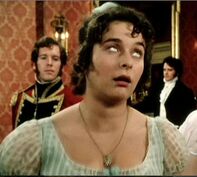 Lydia: vain, ignorant, and idle
Lydia: vain, ignorant, and idle In Emma, Mr. Knightley tells Emma's former governess: "She will never submit to any thing requiring industry and patience… Emma is spoiled by being the cleverest of her family. At ten years old, she had the misfortune of being able to answer questions which puzzled her sister at seventeen.” In Northanger Abbey, Eleanor and Henry Tilney talk with Catherine Morland about reading history books as well as novels.
More broadly, there are references in Austen to girls going astray, either through not learning enough, or from learning the wrong things. Lydia Bennet is "vain, ignorant, idle, and absolutely uncontrolled," and Elizabeth begs her father to step in and correct her. Marianne in Sense & Sensibility is too indulgent of her wild sentimental feelings.
Anne Elliot of Persuasion seems to have her head screwed on straight. Her education furnishes her with quotes from the best poets and essayists for contemplation and consolation. In Mansfield Park, as we've been discussing, there are more explicit remarks from Austen about education than in any other of her novels.
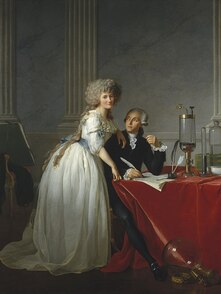 Antoine-laurent Lavoisier And His Wife. She assisted him in his experiments
Antoine-laurent Lavoisier And His Wife. She assisted him in his experiments - In Waldorf: Or, the Dangers of Philosophy (1798) young Lady Sophia dies as a result of listening to a handsome free-thinker's agnostic rhetoric. The poor girl's “weak brain” is overcome; she goes insane and then dies: “[D]oubts and fears operated with equal violence; ancient prejudice on one hand, and Waldorf’s arguments on the other, distracted her… [and] reduced her to a dreadful decline, wasting sickness preyed on her bloom…Struggling reason was dashed from her throne, and the wretched girl became a victim to the tenets of Waldorf.”
- The protagonist of Thinks I To Myself (1811) refuses to marry Grizilda Twist, the heiress next door: “Nothing, I think, can ever possibly persuade me to marry a woman so erroneously and so foolishly educated.”
- In A Winter in London (1806) Mr. Ogilvy thinks girls should not study science. “Have they not music and dancing? Have they not the exercise of fancy and taste in all the articles of dress… besides, I would even allow them a dip into botany and horticulture; --all this may do well enough for amusement. But let me not hear the studies of abstruse sciences called feminine amusements, and the severest labours of human intellect termed pastimes for ladies!”
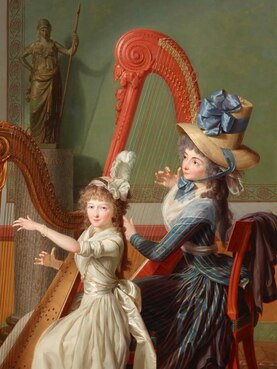 The Harp Lesson , Mme. de Genlis and Mlle. d’Orléans Ausschnitt., by Jean-Antoine-Théodore Giroust
The Harp Lesson , Mme. de Genlis and Mlle. d’Orléans Ausschnitt., by Jean-Antoine-Théodore Giroust In her introduction to a modern edition of the French novel Adelaide and Theodore, Gillian Dow tells us that the novel illustrates the “responsibility” of “individual families to educate their daughters. A well-educated daughter will, like Adelaide, live a happy and contented life as a devoted wife and mother, a woman who is also the intellectual companion of her husband. A badly educated daughter can only come to ruin and despair.” When Madame de Valcy destroys her fortune and her marriage, the root cause is traced back to her faulty upbringing.
But... isn't it an article of faith among us moderns that under the bad old patriarchy, women were kept in ignorance and discouraged from learning anything? We can't touch on this topic without recalling Austen's famous remark in Northanger Abbey: "A woman especially, if she have the misfortune of knowing anything, should conceal it as well as she can... I will only add, in justice to men, that though to the larger and more trifling part of the sex, imbecility in females is a great enhancement of their personal charms, there is a portion of them too reasonable and too well informed themselves to desire anything more in woman than ignorance."
Despite our views of the past and despite Austen's tongue-in-cheek assertion, the reality is more nuanced. The heroines of sentimental novels were usually portrayed as being intelligent and accomplished, which tells us that some learning, at least, was seen as a desirable thing for genteel females. When the lovely Seraphina comes from Wales to London in Seraphina (1809), she rouses the jealousy of Lady Avondale, who sneeringly describes her as “highly accomplished and exquisitely graceful; she is besides a wonder of learning—skilled in all the abstruse sciences, and to sum up the whole, a downright monster of perfection.”
Often the heroine's intelligence and breeding was portrayed as being acquired intuitively. Emmeline, in The Orphan of the Castle, has an “uncommon understanding” and “a kind of intuitive knowledge.” She “comprehended everything with a facility that soon left her instructors behind her.”
In Clarentine, a would-be seducer flatters the heroine that he cannot understand how she came to be so very accomplished: “brought up in such profound retirement; living in a place whence all professional excellence was so far removed [ie far away from the benefit of good masters to teach her] and where, consequently, you had as few means of improvement, as incitements to emulation—how, I beseech you—how did you acquire talents so bewitching, and manners so irresistible? Am I, at last, to believe in all I have heard reported of innate and intuitive endowments? Am I to suppose you were born with all these advantages?”
Austen parodies this type of accomplished heroine In Northanger Abbey, writing that her heroine Catherine Morland “never could learn or understand anything before she was taught; and sometimes not even then, for she was often inattentive, and occasionally stupid.”
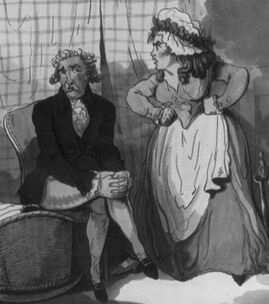 "The Sweet Delights of Love" with a scolding wife
"The Sweet Delights of Love" with a scolding wife This description is not unlike Austen’s portrait of Catherine Morland: "The day which dismissed the music-master was one of the happiest of Catherine’s life... Writing and accounts she was taught by her father; French by her mother: her proficiency in either was not remarkable, and she shirked her lessons in both whenever she could... she was moreover noisy and wild, hated confinement and cleanliness, and loved nothing so well in the world as rolling down the green slope at the back of the house."
These heroines, in other words, are humorously chided for not applying themselves to their studies and tasks.
So plenty of heroines were presented as being reasonably well-educated and intelligent, and as we will see in the next post, there were plenty of heroes who wanted intelligent wives. In the Bristol Heiress: or the Errors of Education (1809) a handsome young clergyman falls for the lovely heiress, who is off to enjoy the season in London. He’s worried that London will corrupt and seduce her. “Must we not then, under such circumstances, tremble for women?” he writes to a friend. “Reason tells us we must. Our education is better than theirs; we are taught to think, they are left only to feel. Why is it not considered as a duty by every parent, to improve the reasoning faculties of the female mind, and thus give more real worth to that sex, whose influence penetrates deeply into almost all the affairs of civilized life?”
Even Thomas Gisborne, author of An Enquiry into the Duties of the Female Sex, does not object to cleverness in women. He writes that men who don't like being married to clever women are “absurd.” What is more objectionable to men is bad temper. “[I]f strength of understanding in a woman be the source of pride and self-sufficiency; if it renders her manners over-bearing, her temper irritable, her prejudices obstinate; we are not to wonder that its effects are formidable to the other sex… But is arrogance, is impatience of contradiction, is reluctance to discern and acknowledge error, the necessary or the usual fruit of strong sense in the female mind? Assuredly not…. Let talents be graced with simplicity, with good humour, and with feminine modesty; and there will seldom be found a husband whose heart they will not warm with delight.”
What do the novels of the day have to say about the qualities of an ideal wife? Next time.
| |
| In my Mansfield Trilogy, the recurring characters of Lord and Lady Delingpole are notorious among their friends for their public squabbling. Click here for more about my novels. |
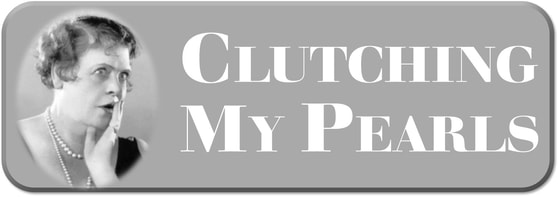
 RSS Feed
RSS Feed